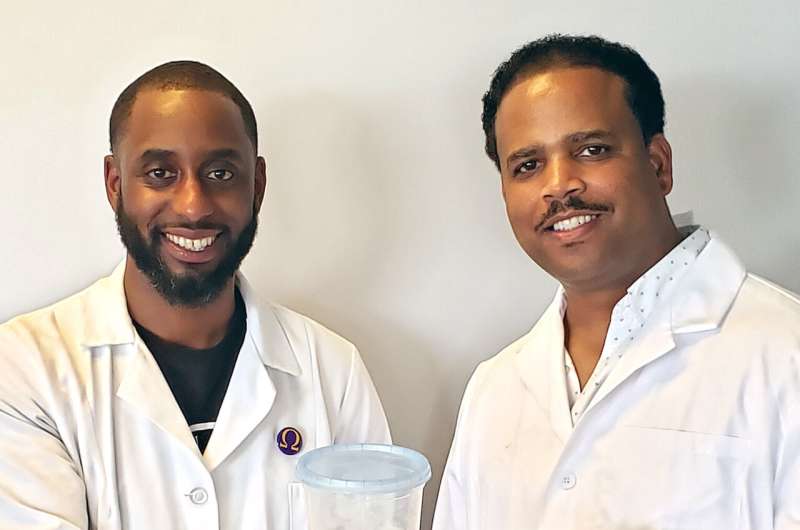New discovery holds promise for reducing climate change threats

Researchers at Tuskegee University have modified and discovered new bio-based natural materials that could eliminate the harmful buildup of carbon dioxide in the atmosphere. They believe the use of naturally occurring nanocellulose holds the key to efficiently and cost-effectively mitigating carbon dioxide and other greenhouse gases associated with rising global temperatures and extreme weather events.
Scientists worldwide agree that a rise in carbon dioxide is warming the planet to unsustainable levels and temperatures—a phenomenon commonly referred to as "climate change." Since the beginning of the Industrial Revolution, researchers have observed significant amounts of carbon emitted into the atmosphere—with the concentration of carbon dioxide at an all-time high today.
At Tuskegee, Dr. Michael L. Curry, an associate professor in the Department of Chemistry, and engineering doctoral student Donald White have created a new means of capturing carbon dioxide from the atmosphere that promises to be more effective, environmentally friendly and less expensive than the conventional carbon-capture methods used currently.
Instead of increasing the rate of carbon dioxide removal through changes in land and forestry usage and geoengineering techniques, the Tuskegee-developed technology relies on materials taken from agricultural waste products called nanocellulose, which is capable of capturing, storing and releasing carbon dioxide from the atmosphere without any external influences.
"Nanocellulose is a natural material that can be found in abundance on this planet," Curry said. "Using this material to develop new technologies for the capture and storage of carbon dioxide will only push the boundaries of science toward the development of new systems that promotes a cleaner and cooler atmosphere."
The researchers' nanocellulose-based process relies on using naturally occurring plant-based materials as filters to remove dangerous carbon dioxide buildup in the atmosphere. In addition, if this new technology is used as a means to reduce carbon dioxide, this natural material can be reused in the environment for remediation.
Climate change has an enormous impact on our everyday lives and economy. One day, one week or one month during which it is too hot, too cold or too dry can significantly alter agricultural productions. Even more, climate change's influence on the occurrence of popup storms or massive flooding can lead to environmental and human catastrophes.
According to Curry, the levels of carbon dioxide will only keep rising unless there is something done to counteract it. In fact, in April 2019, scientists reported a new record high of 415 parts per million of carbon dioxide—yielding a total increase of 1 trillion metric tons of carbon dioxide over approximately 250 years.
"We made this problem, but by developing and employing the appropriate technology to reduce the amount of carbon dioxide in the atmosphere, we can also make a better, healthier planet for centuries to come," he said.
Provided by Tuskegee University




















